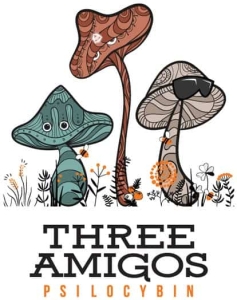Magic Mushrooms and Chronic Pain: Can Psychedelics Be an Alternative Treatment?
Chronic pain is a debilitating condition affecting millions of people worldwide. Traditional treatments such as opioids, NSAIDs, and other pharmaceuticals often come with unwanted side effects and the risk of dependency.
However, a new wave of interest in psychedelics, particularly psilocybin, the active compound in magic mushrooms, is emerging as a potential alternative for chronic pain management.
In recent years, studies have begun to explore whether mushrooms for pain relief could offer a safer and more effective solution for those suffering from long-term pain conditions.
Exploring the benefits of shrooms for chronic pain
Psychedelics like psilocybin are known for their mind-altering effects, but they also have properties that may help alleviate chronic pain.
Psilocybin works by interacting with serotonin receptors in the brain, specifically the 5-HT2A receptor, which is linked to mood, perception, and cognition.
This mechanism is believed to have a downstream effect on pain perception, which may explain why psilocybin for pain could be effective.
The most common approach being studied is microdosing mushrooms for pain.
Microdosing involves taking small, sub-hallucinogenic doses of psilocybin, often on a structured schedule. Proponents argue that microdosing offers the therapeutic benefits of psychedelics without the intense psychedelic experience.
Users report that it helps alleviate the emotional and mental toll of chronic pain by reducing anxiety, stress, and even the perception of physical discomfort.
But what does the research say?
Several early-stage studies and anecdotal evidence suggest that microdosing psilocybin might be beneficial for those suffering from various forms of chronic pain, including migraines, fibromyalgia, and neuropathic pain. This is promising, as traditional treatments for these conditions often have limited efficacy or come with serious side effects.
What the studies say about psychedelics and chronic pain
Emerging research into the use of magic mushrooms for pain relief is showing promising results, particularly for conditions where traditional treatments have fallen short.
Several studies have begun to focus on how psychedelics like psilocybin can alleviate chronic pain by affecting brain function and pain perception.
A study on microdosing psilocybin for chronic pain discovered that patients felt significant pain reduction after regularly microdosing psilocybin. The study documented not only decreased pain intensity but also improvements in the patient’s mood and overall quality of life.
This case adds to a growing body of evidence suggesting that microdosing psilocybin may offer long-term pain relief without the typical side effects associated with opioids and other pain medications.
Furthermore, a comprehensive review from Scientific American delves into the potential mechanisms behind psychedelics and pain relief. Psilocybin seems to interact with the brain’s default mode network (DMN), which is often overactive in people suffering from chronic pain.
By disrupting this hyperactivity, psilocybin allows the brain to “reset,” which may explain the reduction in pain perception. This neural reset effect has shown promise in treating various types of pain, including phantom limb pain and migraines.
Additionally, research published by the National Institutes of Health highlights the broader therapeutic potential of mushrooms for pain. Psilocybin’s impact on serotonin receptors, particularly the 5-HT2A receptor, has been linked to both emotional and physical pain relief.
The review discusses psilocybin’s potential in treating conditions like cluster headaches, migraines, and neuropathic pain, where other medications have limited success.
While more clinical trials are needed to solidify these findings, the research so far supports the idea that psilocybin could be an effective tool for chronic pain management, offering hope to those who struggle with long-term pain conditions.
These studies collectively highlight the growing scientific support for microdosing psilocybin for chronic pain, marking it as a potentially viable alternative for individuals seeking mushrooms for pain relief beyond conventional treatments.
Types of chronic pain psilocybin might help
So, for what types of chronic pain might microdosing for pain offer relief?
Based on the current literature, psilocybin appears to be most effective for certain types of pain conditions, particularly those that are resistant to traditional treatments:
- Migraine and cluster headaches – Psilocybin’s effects on serotonin receptors make it a potential candidate for treating migraines and cluster headaches. In fact, there are anecdotal reports and small-scale studies suggesting that microdosing mushrooms may help prevent these headaches or reduce their severity.
- Neuropathic pain – For those suffering from neuropathic pain, which occurs due to nerve damage, mushrooms for pain may offer some relief. Psilocybin’s ability to disrupt the brain’s pain pathways could make it a viable alternative for individuals who don’t respond well to conventional medications.
- Fibromyalgia – This is another condition that involves widespread musculoskeletal pain, and it often goes hand-in-hand with mental health issues like depression and anxiety. Psilocybin may provide a dual benefit by alleviating both the emotional and physical symptoms of fibromyalgia.
- Phantom limb pain – Early studies have shown that psychedelics can disrupt the brain’s pain perception in those with phantom limb pain, where the brain continues to send pain signals to a limb that is no longer there. Psilocybin’s potential to reset neural pathways may offer a new approach to treating this challenging condition.
It’s important to note that if you plan to microdose with magic mushrooms with the goal of reducing pain from one of the above-mentioned conditions, it’s highly recommended to consult with a medical expert.
The future of mushrooms for pain relief
The growing body of research on psilocybin for pain is just the beginning.
While many of the studies are still in their early stages, the anecdotal evidence and small clinical trials are promising.
People suffering from chronic pain are often left with limited options, and the use of psychedelics like psilocybin offers hope for a more holistic and less harmful approach to pain management.
As scientists continue to explore the potential of microdosing magic mushrooms for pain, there’s reason to believe that psilocybin may eventually become a mainstream treatment for certain types of chronic pain.
However, it’s important to approach this emerging field with caution.
The legality of psilocybin varies from country to country, and further clinical trials are necessary to confirm its safety and effectiveness on a larger scale. In the meantime, those considering microdosing for pain should consult a healthcare professional to weigh the risks and benefits based on their individual health needs.
Conclusion
The potential for psilocybin for pain is intriguing, particularly as an alternative to traditional pharmaceuticals that can carry serious side effects or risk of addiction.
From migraines and fibromyalgia to neuropathic pain, there are promising signs that psilocybin could be a game-changer for those suffering from chronic conditions.
While more research is needed, the future of mushrooms for pain relief looks bright, offering new hope for millions of people worldwide looking for effective and natural alternatives to manage their pain.
James Sullivan is a writer for Three Amigos, specializing in natural remedies and mental health. An advocate for the therapeutic use of psilocybin, he combines his passion for writing with his love for the great outdoors.




